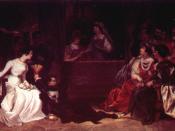Shakespeare was clever in his ways to manipulate his audience. He used his vast knowledge of conflicting cultures and religions to capture the attention of the insightful yet perplexed audience. During the time in which Hamlet was written and performed, the Elizabethans were in great religious confusion. They were familiar with the Catholic faith and traditions, but England had only recently officially turned Protestant. Moreover, Hamlet is set in Denmark, but the intended audiences are Englishmen. The contradictory cultures and religions draw the audience intensely into the play. Shakespeare takes the ElizabethansÃÂ transitional vexed state between Catholic to Protestant views as an advantage and produces a play using the differing sides to coax a response from his audience. Among the numerous differences in religion and culture, the issues of suicide, purgatory, and revenge stand out above others.
Suicide, a constant struggle in Hamlet, is significantly influenced by religion. Hamlet starts off his first soliloquy by stating that if self-slaughter is be legal in the eyes of God, he would commit suicide.
Hamlet's decisions are swayed by a higher authority. The audience relates to the story by agreeing with Hamlet, who believes that suicide leads to eternal damnation. ÃÂImmediately after death the souls of those who die in a state of mortal sin descend into hell, where they suffer the punishments of hell, 'eternal fire" (Catechism of the Catholic Church, 1035). Suicide, which is considered as wanton and as a mortal sin by Christians, would guarantee a free pass to Hell. The audience is swayed to support Hamlet, who turns to his Christian beliefs in his decision to not kill himself.
A major religious confusion at the time was over the afterlife. The ghost of HamletÃÂs father claims to be in purgatory. In Catholicism, purgatory is where ÃÂafter death they [diseased] undergo purification, so as to achieve the holiness necessary to enter the joy of heavenÃÂ (Catechism of the Catholic Church, 1030). In Christian terms, the ghost is doing penance ÃÂtill the foul crimes done in [his] days of nature / are burnt and purgÃÂd awayÃÂ (Hamlet 1.5.12-13). The Elizabethans, with their overwhelming knowledge in Catholicism, as opposed to Protestantism, would agree with Hamlet that the ghost was indeed harmless. On the other hand, Protestants believe that there is no such thing as purgatory; of all the branches of Christianity, only Catholics believe in purgatory. This confusion in religion manipulates the Elizabethans in their reactions to the play. Elizabethans, who were only recently introduced to Protestantism, would naturally believe that ghost was indeed in purgatory, but the Protestants would question the appearance of the ghost.
Revenge, which is a common theme in the play, is influenced by both culture and religion. In the Danish tradition, the murder of King Hamlet makes HamletÃÂs duty to avenge his father mandatory. This tradition calls for the murder of King Claudius to avenge King HamletÃÂs death. ÃÂDo not seek revenge or bear a grudge against one of your people, but love your neighbor as yourselfÃÂ (Leviticus 19:18). Murder, no matter the reason, violates the Christian ethic of love, including love for oneÃÂs enemy. Shakespeare meant for the audience to take the Christian side of revenge; it is a malefaction. The feud between Hamlet and Claudius conflicts with the traditional Christian laws, forcing the Elizabethan audience to take a side in the story, namely the Christian side. Hamlet is influenced by religious values when he stops himself from killing Claudius while Claudius was praying. Hamlet believes that if he kills Claudius at that moment, Claudius, who is praying, would go to Heaven, thwarting the goal to send his uncle to eternal damnation. Without religion or culture as factors in Hamlet, there would be no long and tragic story of the royal family. From HamletÃÂs avenging demeanor, Claudius would be dead and Hamlet would rule over Denmark.
Shakespeare made use of the uncertainty during his era. His audience was easily swayed to take the controversial positions on the side more familiar to them. The Danish and English cultures clash in Hamlet, as well as the Catholicism and Protestantism confusion. Shakespeare cajoles specific reactions from the Elizabethan audience by using his powerful script writing. He uses his knowledge of the current events of his time to prove to be a successful playwright.
Catechism of the Catholic Church (New York: Doubleday, 1994) 360.
New American BibleShakespeare, William. Hamlet. 8 Nov. 2008 .





